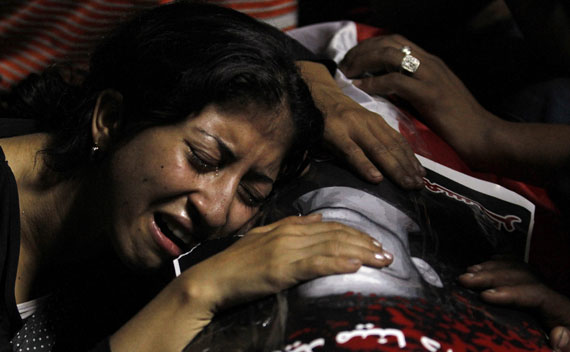Egypt: the Maspero Pogrom and the Failure of Leadership
More on:

If February 11, 2011 demonstrated the very best of Egypt, then October 9, 2011 demonstrated the very worst of Egypt. The only way to describe what unfolded in front of the state television building (and subsequently Tahrir Square), where Copts were protesting over not-so-subtle official efforts to stoke sectarian tension over a church being constructed in Aswan, was an anti-Christian pogrom. The death toll stands at 25 with 300 injured. There have been scattered reports of soldiers and policemen injured, but by far the Copts took the brunt of the violence. Typically, the partisans have now settled into tightly held narratives about what happened. The military maintains that rock and knife wielding Coptic activists set upon security personnel who had no choice but to defend themselves. Copts and those Muslims who sought to defend their fellow Egyptians tell of a different, far more harrowing story of thugs and Salafi activists attacking them for no apparent reason with the complicity of soldiers and policemen. Both sides claim to have video proof of their accounts.
The specific rights and wrongs of this disturbing episode will be litigated on Twitter, Facebook, and Egypt’s lively talk shows, but largely to no real good or progress. Egypt is a society that is increasingly polarized—a stunning turn from the apparent national unity of late January and the first eleven days of February. The violence of the 9th and the lingering mistrust make a mockery of the billboards declaring “We are all Egyptians” that now dot Egypt’s roadways and buildings. What happened? How did the Egyptians get here?
From my vantage point (which, as I write, is at 35,000 feet and a few hundred miles east of Halifax, Nova Scotia), there are three interrelated reasons for the seeming breakdown of social cohesion.
1. The Supreme Council of the Armed Forces may hold executive power, but it has exercised precious little in the way of national leadership. Rather than provide a clear political horizon for Egyptians, Field Marshal Tantawi prefers to issue communiqués (really trial balloons) that are then subject to an unpredictable political process that pits Egypt’s myriad social forces against each other, with the military compromising or taking sides as its interests dictate. This has only contributed to confusion, discontent, polarization, and ultimately violence. This does not seem to be the result of some nefarious plot—though instability could, like the Free Officers in 1954, conceivably serve the SCAF’s interests—but rather a distinct lack of strategic thinking and a fair amount of incompetence.
2. There is no moral leadership in Egypt right now. Liberals had hoped that Mohammed ElBaradei would play that role even before the uprising. ElBaradei is in many ways an appealing politician, but there are big questions whether he can attract Egyptians beyond a relatively small group of liberals. In addition, he has been cagey about getting directly involved in Egypt’s tumultuous political arena. He seems to want to play it safe for the moment for fear of undermining his credibility by riding the news cycles, but the tweets and statements from behind the walls of Garana compound just won’t do it. If ElBaradei wants to be the moral conscience and leader of a new political order like so many had hoped when he returned to Egypt in February 2010, he had better get more engaged before the opportunity passes him by, unless it already has. Who else is out there? Abdel Monem Aboul Futouh—the self proclaimed “Egyptian Erdogan?” He is seems suspect in the eyes of many. Selim al Awa? Unlikely. Ahmad Shafiq? Moral authority? Omar Suleiman? Only in the wildest dream of the Israelis. Who is the Egyptian who has the prestige across communities, political groups, social movements, and activists who can be the badly needed moral conscience necessary to midwifing a new, more decent political order? I don’t know.
3. Finally, the ghosts of the past regime have come back to haunt Egyptians. Mubarak and his henchmen did not create sectarian tension, but they accentuated it for their own ends. Mubarak and Habib al Adly did not invent the Salafist current, but they gave it succor. Mubarak and his associates did not invent manipulation, but they made it a high art form. The former president perniciously manipulated Egyptian society, slicing and dicing it through three decades of power all in the service of perpetuating Mubarakism. Egyptians are now paying the price for this cynicism.
In a recent FP.com piece, I was generally optimistic that Egyptians were debating openly and intensely what kind of society they want. The recent spasm of sectarian violence has the potential to shut down that healthy development. I hope it doesn’t.
N.B. For those of you who may not have noticed, my book, The Struggle for Egypt: From Nasser to Tahrir Square is now out (please click on the title for the book’s webpage). You might be interested in the mini-documentary that I put together with the help of my talented colleagues from CFR’s Media department. Please click here: Egypt’s Quest for Democracy: From Nasser to Tahrir Square. Please let me know what you think of both the book and the video.
More on:
 Online Store
Online Store
